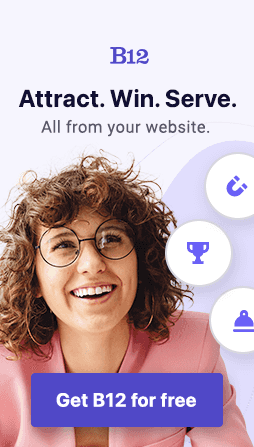Build an AI website in 60 seconds
AI generates your personalized website instantly with built-in scheduling, payments, email marketing, and more.
Start for free
The importance of sending personalized emails to leads

Businesses must find creative ways to engage with their target audience and build meaningful relationships. Personalized emails have become a popular strategy for lead generation, as they allow businesses to tailor their messaging to meet the unique needs and preferences of each recipient.
In this blog post, we'll explore the importance of personalized emails for lead generation, how it improves engagement and open rates, tips for personalizing email content to increase effectiveness, the role of personalization in building trust and credibility, using automation to scale personalized emails for higher conversion rates, and key metrics to track to measure the success of personalized email campaigns. Let's dive in!
Understanding the importance of personalized emails for lead generation
Personalized emails have become crucial for lead generation, with many marketers incorporating this strategy into their marketing mix. Personalized emails are designed to provide recipients with content that is tailored to their needs and interests, which can improve engagement and generate higher return rates. These emails are highly effective in driving conversions and building long-term relationships with customers.
The significance of personalized email marketing is underscored by the fact that over 70% of consumers prefer personalized emails from businesses that they've interacted with. This means businesses that are not utilizing personalized emails are missing out on a significant opportunity to engage their audience and drive conversions. Personalization goes beyond simply addressing recipients by name—it involves getting to know their specific preferences and creating content that resonates with their interests.
Personalized emails can improve engagement and open rates, leading to higher conversion rates. With the average person receiving over 100 emails per day, it's essential that companies create personalized emails that stand out from the crowd. By sending relevant content that resonates with recipients, businesses can generate higher open rates, and ultimately, more conversions. Meeting the needs of each customer also increases customer loyalty, which can result in long-term value for the business.
The importance of personalized emails in lead generation can't be overstated. As buyers become increasingly savvy and selective, businesses that provide a personalized, tailored experience will gain an edge in their marketing efforts. By understanding customer preferences and addressing their needs through personalized emails, companies can improve engagement and ultimately, increase their bottom line.
How personalized emails improve engagement and open rates
Personalized emails have become a crucial part of any successful digital marketing strategy. One of the main reasons for this is that they have been proven to significantly improve engagement and open rates. In other words, personalized emails increase the chances of recipients actually reading and responding to the emails they receive. This is particularly important for lead generation, as it helps increase the number of qualified leads and ultimately drives business growth.
There are several strategies that businesses can use to personalize their emails and improve engagement. One approach is to segment their email lists based on specific criteria such as demographics, interests, or behaviors. This allows marketers to create targeted messages that are more relevant to each recipient, increasing the likelihood of them taking action (such as making a purchase or signing up for a newsletter).
Another way to personalize email content is to use dynamic content that changes based on the recipient’s behaviour. For example, if a user has shown interest in a particular product or service, the email content can reflect this by showcasing relevant content or promotions. This not only helps the recipient feel like their interests are being acknowledged and catered to, but also increases the chances of them purchasing or taking other desired actions.
When it comes to personalized emails, every little detail counts. This includes things like using the recipient’s name in the subject line or body of the email, referencing their recent activity on your website or social media channels, and even incorporating visual elements that are relevant to their location or interests. By investing the time and effort into personalizing your emails, you can create a more engaging and effective marketing strategy that drives long-term growth and success for your business.
Tips for personalizing email content to increase effectiveness
Personalization is crucial if you want to improve the effectiveness of your email campaigns. To make your emails more personalized, start with the subject line. Use the recipient's name or their company name to make the email appear more tailored to them. It's also important you understand their pain points and interests to create content that responds to their specific needs.
Another strategy to enhance the personalization of your emails is to make the message more dynamic. For instance, use pictures or videos that relate to the recipient, or incorporate their latest social media updates to make the emails look more tailored to them. You can also choose to tailor the content of the message to the buyer's journey stage - this can help you make your email campaigns more successful.
Ensure your email messages present relevant and meaningful content. Personalization involves anticipating reader behavior and particular buying intent while providing them messages that can encourage them to take action. By creating targeted messaging, you'll have better chances of driving a response from your prospective customers. So, ensure your email campaign is providing valuable insights to your target audience.
One secret to the success of a personalized email campaign is using segmentation. Segmenting your email list according to various criteria such as gender, location, and interest can significantly help you create tailored messages that resonate with your audience. As a result, not only do you achieve higher open rates but you are also in a much better position to develop trust and familiarity with your subscribers.
The role of personalization in building trust and credibility
When it comes to building trust and credibility with potential customers, personalized emails stand out from generic and impersonal messages. By addressing customers by their name and tailoring content to their specific interests and needs, businesses can demonstrate that they value their prospects as individuals rather than just another lead in the pipeline. This personalized approach can help to establish a relationship of trust and confidence, which is critical for converting leads into paying customers.
One of the key benefits of personalized emails is that they allow businesses to align their messaging with the needs and preferences of their target audience. By taking the time to understand what motivates and drives their prospects, businesses can deliver content that speaks directly to their pain points and desires. This targeted approach can result in higher engagement rates, longer website visits, and ultimately, a better chance of converting leads into loyal customers.
Another advantage of personalized email campaigns is that they can help to build a sense of community and connection with prospects. By sharing relevant and timely information, offering exclusive promotions or discounts, or inviting customers to participate in surveys or events, businesses can create a dialogue with their audience that goes beyond a simple sales pitch. This kind of engagement can help to deepen relationships, foster loyalty, and ultimately lead to long-term customer satisfaction and retention.
Finally, personalized emails can provide valuable insights and feedback that businesses can use to refine their marketing strategies and improve their overall performance. By tracking recipient engagement, response rates, and other key metrics, businesses can gain a better understanding of what is working and what needs to be adjusted for optimal results. This data-driven approach can help to ensure that marketing efforts are focused on the most promising leads and are optimized for maximum effectiveness.
Using automation to scale personalized emails for higher conversion rates
Personalization has become a necessity for lead generation efforts in today's digital landscape. But with an ever-growing number of prospects, personalized communication can be a daunting task. Luckily, with email automation, it's possible to scale and personalize campaigns for higher conversion rates. Using an email marketing platform, businesses can segment their contact list and set up targeted email campaigns that deliver personalized content to selected groups of recipients.
Automating emails can not only save time for businesses, but it can also help to ensure consistency and reduce the risk of error. With automation, businesses can set up a series of automated emails that are triggered by specific actions or behaviors, such as downloading an ebook or attending a webinar. This allows businesses to engage at the right time and with the right message, based on the prospect's stage in the sales cycle.
The use of dynamic content in personalized emails can further create a more unique and relevant experience for leads. Personalized subject lines and greetings can invite a prospect to open the email, while dynamic content can tailor email body content based on their interests, location, or past interactions. With dynamic content, businesses can show that they understand their lead's specific needs and can provide valuable solutions at the right moment.
Additionally, it's important to regularly review and adjust email campaigns for maximum effectiveness. By measuring the performance of email campaigns through key metrics, such as open rates, click-through rates, and conversion rates, businesses can identify which tactics are working and which need to be revised. By consistently monitoring and refining campaigns, businesses can continually optimize their lead generation efforts for maximum impact.
Measuring the success of personalized email campaigns: key metrics to track
One of the keys to creating effective personalized email campaigns is tracking their success. Measuring the performance of your email campaigns is important to optimize them and get better results. It enables you to see what's working and what's not, so you can adjust your strategy accordingly.
There are several key metrics you can track to determine the success of your personalized email campaigns. One of the most important is the open rate, which indicates the percentage of emails that were opened by recipients. A low open rate may indicate that your subject lines need improvement, or that your emails aren't making it to recipients' inboxes.
Another important metric to track is click-through rate or CTR, which refers to the percentage of recipients who clicked on a link in your email. A high CTR indicates that your content is relevant, well-targeted, and engaging. If your CTR is low, you may need to adjust your messaging or calls to action.
Conversion rate is another key metric to track, which measures the percentage of recipients who completed a desired action, such as making a purchase or filling out a form after clicking through to your website. Your conversion rate can tell you how effective your email campaigns are at generating leads and driving revenue.
In addition to tracking these key metrics, it's important to analyze the overall ROI of your email campaigns. This requires tracking the cost of your campaigns (including design, content creation, email software, and labor costs) against the revenue generated from your campaigns. This will give you a clear picture of how well your campaigns are working and where you can make improvements.
Attract, win, and serve more clients
Receive helpful resources directly to your inbox to help you succeed online.
Draft your site in 60 seconds
Get an AI website made specifically for you that's free to launch.
Start for free ✨No credit card required
Spend less time on your website and more time growing your business
Let B12 set up your professional online presence with everything you need to attract, win, and serve clients.




